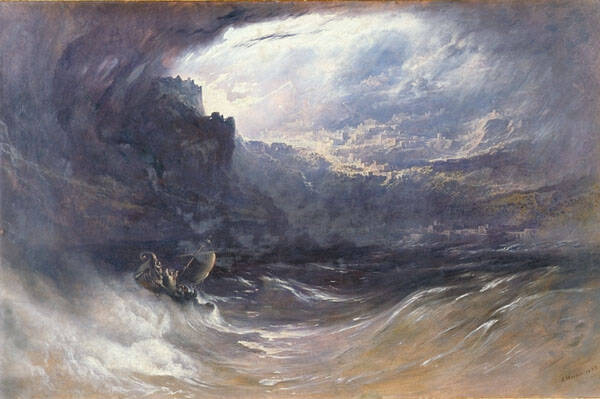A Homily for the Nineteenth Sunday in Ordinary Time
1 Kings 19:9a, 11-13a Romans 9:1-5 Matthew 14:22-33
Storms we can weather are not the worry. It is the ones that leave only a wasteland in their wake.
We may be quite frightened during a storm—St. Matthew tells us that the disciples were not delivered from their panic until the fourth watch of the night, almost dawn—but when the tempest abates, it takes its terror with it. Typically, a sense of satisfaction then follows our survival. “Quite a storm we had last night, wasn’t it?”
But there are storms that both shock and steal. We expect neither their severity nor their lasting significance: An old, beloved tree is uprooted; a roof is removed; a crop is decimated; a home is flooded. The storm abates; a wasteland remains.
If the Gospel were primarily concerned with meteorology, its significance would be limited. Few people have their lives permanently reduced to rubble by the weather. And even those that do typically resolve to rebuild, replant.
Here St. Matthew is speaking of the storm as a symbol. These are events that terrify us, set us adrift from others, shake all sense of security from us. Of course we pray during the course of such storms. Even atheists do as much. For atheism, like belief, requires tending. Without some devotion on our part, our shallow choices, for or against faith, can be swallowed by adversity.
Storms we can weather are not the worry. It is the ones that leave only a wasteland in their wake.
“Lord, you can’t take her. Not yet.”
“Sweet Jesus. This will end my career. This can’t be your will.”
“Yes, I need to leave him, but, Good Lord, do you think I can walk off a cliff, walk on water?”
Then the storm abates; the terror takes its leave; and a welcome sense of security returns. Our prayers were answered.
But what of those storms that leave only a wasteland in their wake? The one who was your life is gone. Your way of life is ended. There is no landmark to orient you. No anchor for hope.
Where is your God now? Who is Lord of the wasteland?
There is a Gospel answer to such questions, but it comes with a Gospel goad. The Lord Jesus could calm the fury of nature, yet he submitted to the folly of men and women. He dies with nothing left. “It is finished” (Jn 19:30). He dies, gazing in expectation upon the Father of Mercies. “Into your hands, I commend my spirit” (Lk 23:46). Can we do the same? Accept the wasteland and look to heaven?
Of course, we must first pass through the stages of grief that accompany any great loss: denial, anger, bargaining, depression and acceptance. For a Christian, acceptance means clinging to the cross. “Cling” because we do not choose to take our stand with him. No, he chose to stand with us. His cross is the staff thrown into the water, the mast amidst the waves. Our only choice is to survive by clinging. Sinking, Saint Peter cried out, “Lord, save me!” (Mt 14:30).
Do not forget who God is, the one who makes the wasteland bloom again.
The cross standing amid the rubble reveals two great truths about ourselves and about the course of our lives. The first is our indigence. We are not complete within ourselves, and the storm sweeps away any delusion that we ever were.
Here is the second. There is a going forth and a return in human life, a time to increase and a time to diminish, a time to receive and a time to return. When all is lost, we should realize that everything was always a gift. What came to us through the agency of another must return.
All that we have and all that we are—all must return to God. The massive gothic architecture of St. Thomas Aquinas’ theology rests upon two pillars: our coming forth (exitus) and our return to God (reditus).
We are not our own. We come from another. Either we return to our source, or we dissipate as phantoms. This is the inchoate word Elijah heard in the whispering sound. The storm sweeps away illusions, and the truth of who we are is revealed. We read it in the jagged contours of the wasteland.
But do not forget who God is, the one who makes the wasteland bloom again. Thus, we read in Lamentations.
But this I will call to mind;
therefore I will hope:
The Lord’s acts of mercy are not exhausted,
his compassion is not spent;
They are renewed each morning—
great is your faithfulness! (3:21-23).








